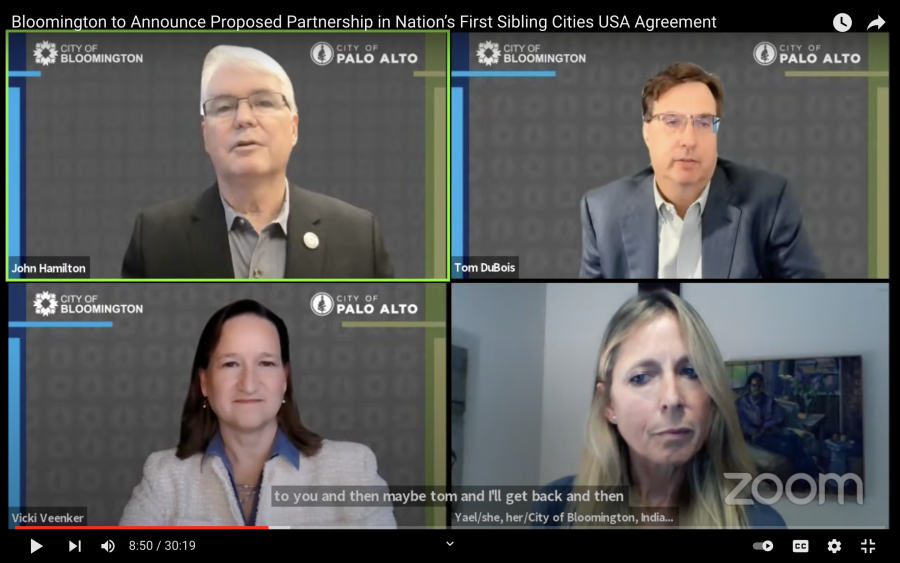To create a partnership for facilitating the exchange of cultural, economic, business and civic ideas, the Palo Alto City Council approved a sibling city relationship with Bloomington, Ind. at its Nov. 15 meeting.
While Palo Alto is already a sister city with eight other cities, including Tsuchiura, Japan, Bloomington will be its first sibling city –– a partnership that is domestic rather than international. This domestic partnership is the first of its kind in the U.S., Palo Alto Mayor Tom DuBois said.
“Bloomington and Palo Alto — being the first cities to do this — we’re kind of the guinea pigs,” DuBois said. “I think it’s going to be a lot of fun. When I visited (Bloomington), I was reading the newspapers there, and I saw a lot of the same issues we have here, just with maybe a little different twist.”
Andie Reed, the Palo Alto coordinator for this partnership, said she is excited to be working on something that has gained support from local politicians and citizens. She said community involvement, including participation from students, is an important part of the partnership.
“Under the current destructive (political) polarization, anything that we can do to get people to know each other and form relationships and then to cross those divides is what this is about,” Reed said.
Reed said while the sibling city project is an official relationship sponsored by the City of Palo Alto, it does not have any fiscal cost. The first step was for the Palo Alto City Council to approve the sibling cities partnership. The next step is for the Bloomington City Council to approve the project in December and for the two cities to plan for a virtual launch in early 2022. From there, Reed said the two cities will continue working toward their long term goals.
“The lofty goal is to design opportunities — to build bridges and learn and benefit from each other, to pull the country together,” Reed said. “But it’s not like you can just force people to see each other’s perspectives. It takes a lot of work to build up to that.”
Bob Wenzlau, president of Neighbors Abroad, which represents the City of Palo Alto in its relations with its eight sister cities and Bloomington, said Palo Alto and Bloomington will be connected on many different levels as sibling cities. City government and staff can share ideas, and non-profit organizations based in each city, such as art centers and community service organizations, can also work together.
“It’s (about) creating relationships and interactions where we’re able to have a discussion about issues of gender, issues of equity, issues of race, issues of economic disparity — and learn from each other,” Wenzlau said.
To establish the Palo Alto-Bloomington sibling city partnership and successfully reach these goals, Neighbors Abroad will work with the two cities’ mayors, Reed and Sibling Cities USA. Sibling Cities USA founder Vicki Veenker said it is a non-profit which aims to match up cities based on similar goals. She said Sibling Cities relationships operate on three pillars — community, commerce and civil discourse.
“You have to see the humanity in each other,” Veenker said. “This is an aspirational program; there will be some people who are skeptical. There will be some people for whom one part resonates and another doesn’t. But everything we can do to increase understanding, fight disinformation with direct information and give people an opportunity to realize the phenomenal assets that exist across this country — that’s got to move us to a better place.”
Student exchange programs, which Palo Alto already has with its eight sister cities, are part of this effort. Senior Wallie Butler participated in a four-week exchange program with students from one of Palo Alto’s sister cities, Tsuchiura, Japan, while in middle school. She said she enjoyed the balance of being able to visit landmarks like a tourist, while also experiencing the Japanese way of life by staying with a host family.
“I think going anywhere outside of your usual environment is a valuable experience,” Butler said. “I think it’s really important that people should get to experience (other environments) because we can all use more perspectives on everything.”
Senior Laura Lengre, who participated in the same program as Butler, said based on her own positive experience with a sister city student exchange program, she supports establishing more exchange programs domestically with sibling cities.
“I think (international exchange programs) definitely seem more fun and different, but different states and different areas of the country can also be great … (especially) for anyone who hasn’t really learned another language,” Lengre said. “There, it’s just English and they wouldn’t feel uncomfortable about having to learn a whole new language for an exchange program.”
Veenker said she receives emails every day from people in both Palo Alto and Bloomington who are thrilled about the idea of a Palo Alto-Bloomington sibling city partnership being successfully established.
“When I go around talking to people about this idea, I don’t have to sell it,” Veenker said. “It sells itself — because Americans right now, they don’t like the situation we’re in, and they are yearning to get past it, yearning for a way that feels accessible and doable. They see that in this program, and I have been delighted with the way it has been embraced by such a broad variety of people.”

